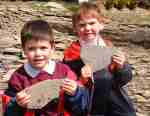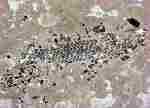 | Caithness.Org | Community | Business | Entertainment | Caithness... | Tourist Info | Site Map |
• Advertising • Chat Room • Contact Us • Kids Links • Links • Messageboard • News - Local & Scottish • News - UK & News Links • About / Contact Us • Submissions |
• Bookshop • Business Index & News • Jobs • Property For Sale • Property For Rent • Shop • Sutherland Business Index |
• Fishing • Fun Stuff • George, The Saga • Horses • Local Galas • Music • Pub Guide • Sport Index • What's On In Caithness |
• General Information • B & Bs • Backpackers • Caravan & Camping • Ferries • Getting Here • Holiday Letting • Hotels • Orkney • Pentland Firth • Sutherland • Taxis |
| N E W S F E E D S >>> |
|
Caithness.org News Bulletins |
||
| Caithness.org News Index | ||
|
Move to Halt Fossil Theft and Damage in Scotland
Fossil collecting is not illegal if permission is obtained from the landowner. There is no desire whatsoever for a blanket ban of such small-scale responsible collecting, as it is a hobby enjoyed by many people, including children and amateurs, some of whom have made remarkable new discoveries. The problem lies with those who collect irresponsibly and without permission. Such collectors do not report their findings, and can destroy rock faces in their attempts to pick off the rarest and most valuable samples. People collecting for financial gain have already damaged sites in Caithness, Orkney, Skye, Lanarkshire and Ayrshire through large-scale removal of fossils, using rock saws and other industrial-scale machinery. In 1992, for example, a collector used a JCB to dig up a fossil bearing rock from ‘Cheese Bay’, near North Berwick and an entire fossil-bearing ‘fish bed’ in Orkney has recently been removed by collectors. The fossil-bearing rocks at the Birk Knowes Site of Special Scientific Interest in Lanarkshire have almost been totally ‘worked out’ as a result of a German fossil collector, who had no permit to excavate the very rare and valuable fossils. Despite negotiations by SNH with the Humboldt museum in Germany, which now holds the specimens, no agreement has yet been reached on giving back the rarest and most important fossils from the site. Dr Colin MacFadyen, SNH Geologist
said: Part of the problem of illegal fossil collection is that many of the sites are in remote locations so the thefts are only detected after the collectors have gone. In addition, many landowners are unaware of the scientific value of the fossils on their land or do not regard irresponsible collecting as a problem. As a result noone reports the crime to the police. Inspector John Grierson, the force
wildlife liaison officer at the Northern Constabulary said: |
||











